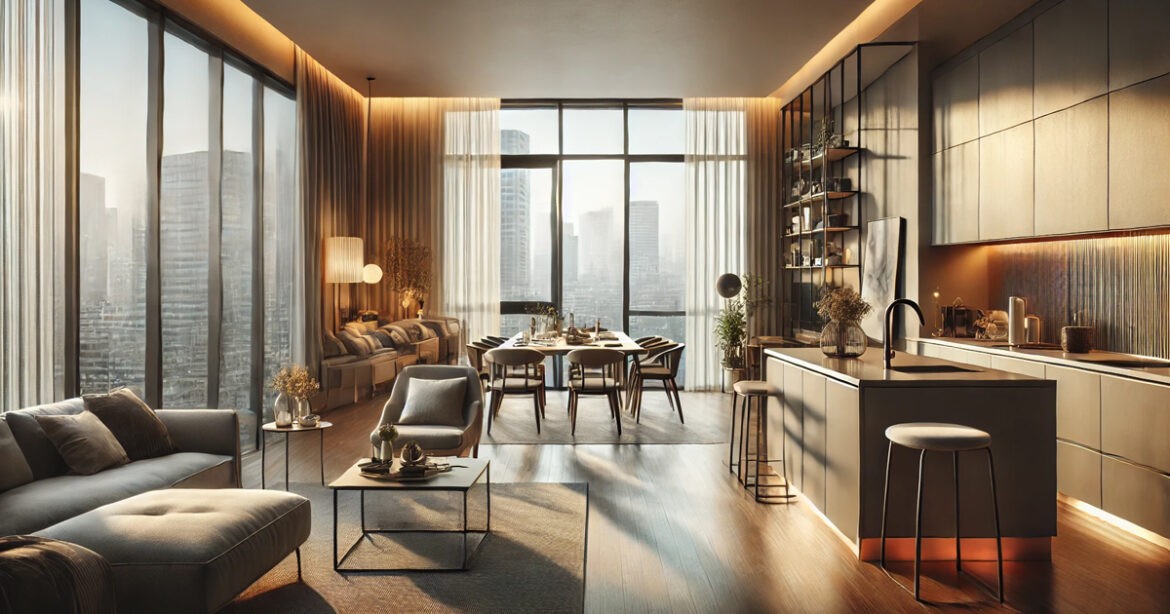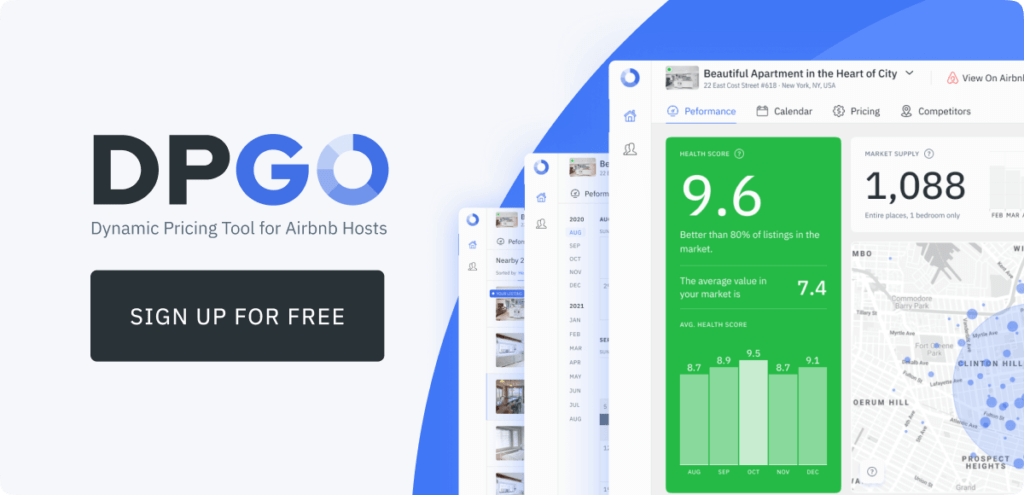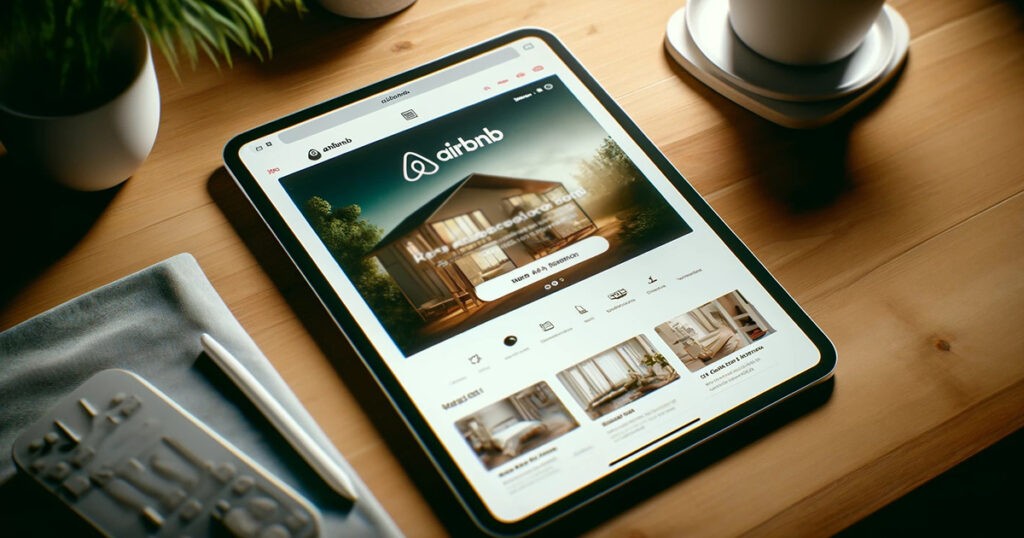Short-term rental trends in 2025 show how quickly the market is evolving. Travelers are no longer satisfied with a bed and Wi-Fi. They want unique experiences that feel personal, comfortable, and memorable. For hosts and property owners, adapting to vacation rental trends in 2025 isn’t optional — it’s the difference between thriving and falling behind.
Design-Driven and Immersive Rentals
In 2025, travelers want more than a place to sleep. They look for design-driven rentals that reflect the character of the destination and feel authentic and memorable. Generic white walls no longer appeal; guests prefer spaces that tell a story.
A well-designed property goes beyond aesthetics — every detail, from furniture to lighting, creates a unique atmosphere that influences booking decisions. Whether it’s a mountain chalet with locally carved wood or a beachside villa with airy tones, strong design sets a listing apart in the short-term rental market 2025.
Why It Matters for Hosting Success
Airbnb’s research shows that unique listings consistently rank higher in search results and attract more clicks. Design delivers tangible business benefits:
-
Pricing power: Guests are willing to pay more for photogenic, immersive spaces that justify premium rates.
-
Occupancy: Distinctive interiors lead to more frequent bookings and longer stays, boosting annual income.
-
Organic marketing: Guests often highlight standout design in reviews or share photos online, creating free visibility in the vacation rental market 2025. Themed concepts — such as a desert retreat with earthy tones or a wellness sanctuary with yoga mats — are especially effective at drawing niche travelers seeking a specific guest experience in short-term rentals.
How Hosts Can Apply This Trend
-
Use local inspiration: Incorporate regional art, textiles, or natural materials for authenticity.
-
Invest in statement pieces: A bold light fixture, distinctive headboard, or artwork can instantly transform a space.
-
Curate experiences: Add cozy reading nooks, outdoor spa areas, or dining spaces designed for gatherings.
-
Showcase with photos: Feature design details prominently, since strong visuals capture attention and convert faster than long amenity lists.
Sustainability Matters More Than Ever
Eco-conscious travel is now one of the strongest short-term rental trends in 2025. Guests are increasingly selective about where they stay, choosing properties that match their environmental values. For many, booking a sustainable vacation rental is just as important as location, price, or amenities. This shift reflects a global change in consumer behavior.
Travelers want their holiday choices to leave a lighter footprint, and they reward hosts who demonstrate responsibility. In the competitive short-term rental market 2025, sustainability isn’t simply a feel-good feature—it’s a major factor influencing bookings, reviews, and repeat stays.
Small Changes with Big Impact
Creating a sustainable short-term rental hosting strategy doesn’t require major renovations. Even modest adjustments can set a property apart:
-
Energy efficiency: Install LED or smart lighting systems and upgrade to energy-efficient appliances.
-
Water conservation: Fit low-flow showerheads and dual-flush toilets, supported by clear guest reminders.
-
Waste reduction: Provide labeled recycling bins, refillable toiletries, and filtered water instead of plastic bottles.
-
Natural materials: Use organic linens, recycled textiles, and reclaimed wood furniture for interiors.
These upgrades appeal to eco-conscious guests while also lowering long-term operating costs.
The Value of Going Green in Short-Term Rentals
Sustainability now delivers measurable business benefits in the short-term rental market 2025:
-
Guest demand: Eco-conscious travelers actively prefer green listings, even at higher rates. Marketed as zero-waste with refillable toiletries and compost bins, quickly becoming a top choice for travelers searching “sustainable stays.”
-
Brand trust: Promoting eco-friendly short-term rental features signals credibility and attracts loyal repeat guests. Positioned as a plastic-free retreat, combining solar energy with family-friendly amenities, which boosted long-stay bookings.
-
Platform advantage: Airbnb and Booking.com highlight sustainable properties in search results, giving them greater exposure.
Communicating Your Commitment
Installing eco-features is only half the job — guests also want transparency. To stand out in the vacation rental market 2025:
-
Highlight features directly in your listing title and description.
-
Add photos of sustainable details like solar panels or refillable toiletries.
-
Share your “green story” in the welcome guide, showing authentic dedication to sustainability.
Workcations and Longer Stays
The rise of flexible schedules has made workcation rentals one of the most important short-term rental trends in 2025. More travelers are blending business with leisure, booking extended stays where they can balance productivity and relaxation. For this audience, the right property is not just a holiday rental but a temporary home office.
What Modern Guests Expect
Professionals booking digital nomad stays and long-term rentals have a clear set of requirements:
-
High-speed, reliable internet that supports video calls and streaming.
-
Dedicated workstations with ergonomic seating and proper lighting.
-
Quiet surroundings or soundproofed rooms for uninterrupted focus.
-
Convenient amenities like coffee machines, blackout curtains, and extended storage space.
Properties that combine these short-term rental trends with thoughtful extras — like a second monitor, ring light, or adjustable desk — stand out in the short-term rental market 2025.
Why Longer Bookings Boost Success
From a business perspective, catering to this audience increases vacation rental hosting success. Longer stays:
-
Raise occupancy rates: Guests staying 3–8 weeks reduce booking gaps.
-
Lower turnover costs: Fewer check-ins mean less cleaning and administrative work.
-
Encourage loyalty: Digital nomads often return to destinations seasonally, creating repeat bookings.
-
Improve reviews: A well-equipped workspace is often highlighted in feedback, building credibility.
Hosts who position their listings as workcation rentals can charge slightly higher nightly rates while enjoying more consistent occupancy.
Positioning Your Property for Remote Workers
To maximize visibility, highlight remote-work amenities in listing titles and descriptions. Phrases like “Work-from-home ready” or “Digital nomad friendly” instantly capture attention. Including photos of desks, chairs, and quiet spaces reinforces the message visually.
This transparent communication shows that you understand guest needs, boosting trust and helping your property stand out in the crowded short-term rental hosting landscape.
AI and Smart Hosting Technology
The latest short-term rental trends trends in 2025 highlight one clear truth: technology is no longer optional. Modern travelers expect seamless, professional experiences, and hosts are turning to AI tools for hosts and smart hosting technology to deliver them. These innovations simplify operations, improve guest satisfaction, and unlock new revenue opportunities in the short-term rental market 2025.
Smarter Pricing, Higher Revenue
One of the most impactful tools is dynamic pricing for Airbnb and other platforms. Unlike static rates, AI-powered pricing systems adjust nightly costs in real time by analyzing:
-
Local events, festivals, and conferences.
-
Seasonality and competitor rates.
-
Shifts in guest demand.
Many hosts credit it with unlocking higher occupancy in low seasons while capturing maximum profit during peak events, making it a go-to solution for achieving vacation rental hosting success.
Automating the Guest Journey
Beyond pricing, AI now enhances the entire guest experience:
-
Smart locks allow 24/7 self check-in and improve security. They also boost guest satisfaction scores.
-
Automated guest messaging answers FAQs, shares house rules, and sends local recommendations instantly. AI-powered messaging cut response times from hours to seconds, increasing review ratings.
-
Maintenance and cleaning apps let staff upload photos, track tasks, and report issues in real time. Automated cleaning schedules reduced turnaround times and allowed same-day check-ins.
These tools not only save hours of manual work but also reduce errors, ensuring guests receive consistent, reliable service. In 2025, adopting smart hosting technology is not just about convenience—it’s about survival in a crowded market. Properties that use automation are:
-
More profitable, thanks to optimized pricing.
-
More appealing, because guests value easy check-ins and instant communication.
-
More scalable, since hosts can manage multiple listings with less effort.
Ignoring this trend risks falling behind competitors who embrace it. For hosts wondering how to succeed as an Airbnb host in 2025, the answer is clear: integrate technology strategically. Start with dynamic pricing, add smart locks, and expand into automated messaging and task management. Then, market these upgrades by highlighting “smart check-in” or “AI-powered pricing” in your listing to stand out.
DPGO has emerged as one of the most advanced platforms in this space. It uses real-time market data and competitor analysis to recommend optimized nightly rates. Beyond simple adjustments, DPGO allows hosts to set custom strategies—such as minimum stay rules, pricing floors, or aggressive vs. conservative revenue approaches.
Tailored Guest Experiences and Niche Marketing
Generic rentals struggle to stand out in the short-term rental market 2025. Guests are no longer impressed by basic amenities—they want spaces that reflect their lifestyle and interests. Whether it’s families, digital nomads, pet owners, or wellness travelers, tailoring your property to a clear audience creates stronger appeal and fuels vacation rental hosting success.
Understanding Different Guest Profiles
Every traveler segment values different details. Recognizing these preferences helps hosts position their property effectively:
-
Families: Play areas, safety features, high chairs, and board games make stays easier for parents.
-
Pet Owners: Bowls, treats, outdoor space, and pet-friendly furniture policies build loyalty.
-
Wellness Travelers: Yoga mats, meditation corners, air purifiers, and calming interiors add value.
-
Digital Nomads: Ergonomic desks, reliable Wi-Fi, and long-stay discounts attract remote workers.
These niche guest experiences in short-term rentals help listings connect emotionally with travelers instead of competing on price alone.
Real Examples of Niche Marketing Success
-
Pet-Friendly Cottage in Cornwall: Gained repeat bookings after adding a dog washing station, treats, and fenced outdoor space.
-
Wellness Villa in Bali: Positioned as a retreat with yoga mats, organic toiletries, and meditation areas. Reviews frequently praised the “restorative atmosphere.”
-
Family Cabin in Colorado: Offered bunk beds, a game room, and hiking maps. Parents highlighted it as “perfect for kids” in reviews, boosting visibility.
Each of these properties carved out a niche, showing how to succeed as an Airbnb host in 2025 through targeted guest experiences.
Marketing Your Unique Offering
Delivering the right amenities is only half the work—marketing them effectively drives bookings. To maximize visibility in the vacation rental market 2025:
-
Use listing titles like “Family-Friendly Cabin with Play Area” or “Digital Nomad Loft with Workspace”.
-
Highlight niche amenities with photos—desks, pet beds, or yoga corners are highly clickable.
-
Share lifestyle-focused descriptions that paint a picture of the experience, not just the property.
By doing so, you transform your listing from a simple stay into a tailored experience that attracts the right audience.
The Long-Term Value of Niche Experiences
Focusing on tailored experiences doesn’t just improve short-term bookings — it builds long-term growth in short-term rental hosting. Specialized rentals:
-
Encourage repeat stays because guests feel understood.
-
Generate positive reviews that emphasize lifestyle fit.
-
Create organic marketing, as guests share their experiences online.
Niche marketing shifts your property from being “just another option” to becoming the perfect choice for a specific type of traveler.
Navigating Regulations in Short-Term Rental Trends
Across the globe, governments are tightening rules for vacation rental market. In the short-term rental market 2025, compliance is no longer optional—it’s a core part of vacation rental hosting success. Cities are introducing licensing systems, stricter zoning laws, occupancy limits, and tax collection requirements. For hosts, adapting to these changes is essential to protect income and maintain a professional reputation.
Common Rules Hosts Must Follow
While regulations vary by region, several themes appear consistently:
-
Licensing and Registration: Many cities now require hosts to apply for permits before listing.
-
Occupancy Limits: Restrictions on how many guests can stay at once help manage neighborhood impact.
-
Local Taxes: Platforms like Airbnb may collect taxes, but in some areas, hosts must report and pay directly.
-
Insurance and Safety: Fire alarms, carbon monoxide detectors, and liability insurance are often mandatory.
Failing to follow these short-term rental trends can result in heavy fines or removal from platforms, making compliance a critical aspect of vacation rental hosting.
Communicating Trust to Guests
Being proactive about rules also improves the guest experience. To reassure travelers:
-
Mention licensing numbers in your listing.
-
Highlight safety equipment such as fire alarms and emergency exits.
-
Explain how taxes are handled, so guests know there are no hidden fees.
-
If relevant, describe insurance coverage for peace of mind.
This transparency not only complies with the law but also creates a sense of security, which is crucial for modern travelers.
Balancing Compliance and Marketing
While regulations can feel restrictive, they don’t have to limit creativity. Smart hosts learn how to market a vacation rental to niche guests while staying compliant. For example:
-
A licensed family-friendly rental can highlight child-safety measures as both a compliance point and a guest benefit.
-
An eco-certified property meets environmental rules while standing out as a sustainable vacation rental.
By weaving compliance into your brand story, you show responsibility while appealing to travelers who value professionalism.
Thriving in the 2025 Short-Term Rental Market
The key to vacation rental hosting success in 2025 is adaptability. The short-term rental trends are changing quickly, and hosts who embrace immersive design, sustainable practices, workcation rentals, and AI tools for hosts gain a clear advantage. Guests now expect more than just accommodation—they look for meaningful experiences that reflect their lifestyle and values.
By focusing on niche guest experiences in short-term rentals, staying compliant with local rules, and adopting smart technology, hosts can secure higher occupancy, stronger reviews, and repeat bookings. The future of short-term rental hosting belongs to those who combine creativity with professionalism, building properties that stand out in the competitive vacation rental market 2025.









Comments are closed.